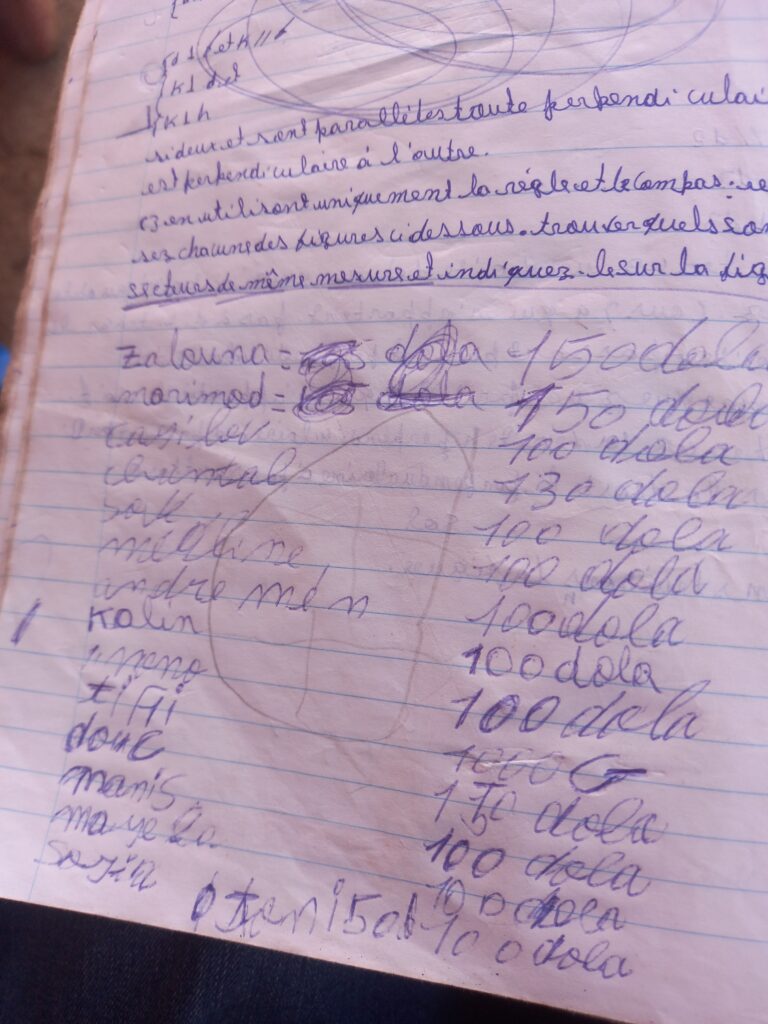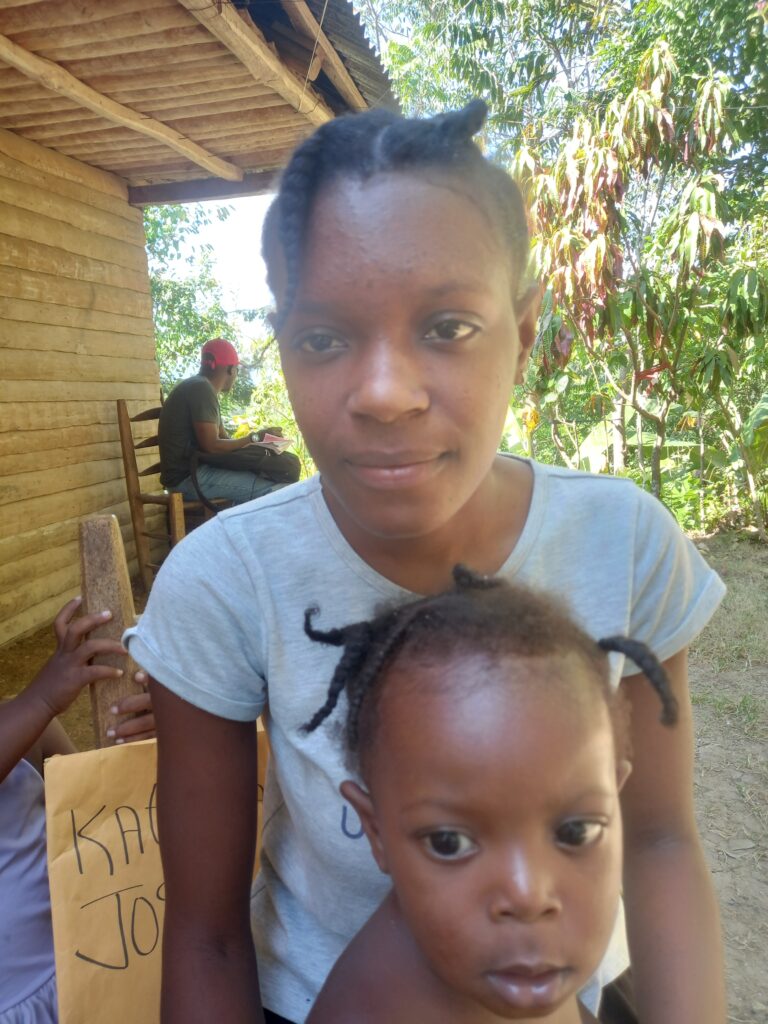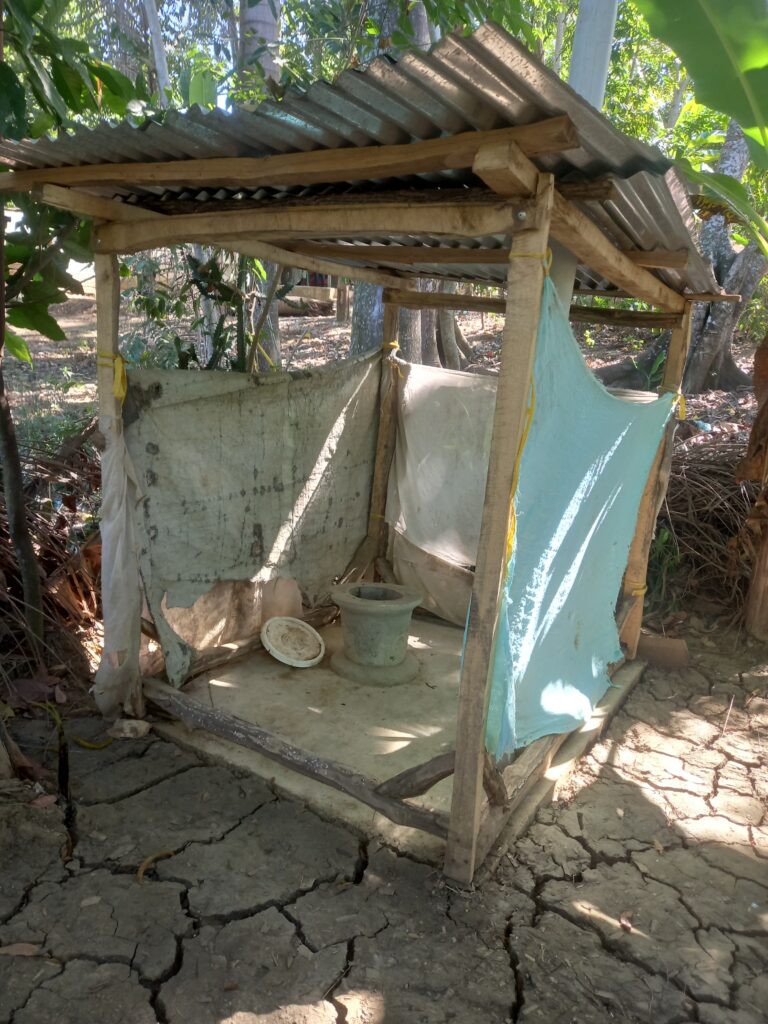I spoke to Roseline Jean a little over a month ago. (See: here.) She was struggling. Her children’s father passed away, and her new partner is off working in the Dominican Republic. He accepts her three children, but she isn’t sure how motivated he is to really help them. A sick baby led to expenses and to days of missed work that only made things harder, and one of the two goats that she received fro the program died shortly after she received it.
She has made good progress in the short time since we spoke. Her focus now is on her commerce. She still sells fried snacks in front of her home in the afternoons. It’s a small, but steady income. She was previously buying produce by the sack as a second activity and selling it in smaller quantities, but she gave that up because prices became too unpredictable. And, especially as main harvest season passed, it was hard to count on profit.
So she tried something else. For many Haitian families, Sunday dinner is something special. It is the one day of the week on which even poorer families try to eat meat. She buys chicken meat in Laskawobas every Saturday and delivers it to her clients late in the afternoon so that they can prepare it for their Sunday meal. She sells on credit, and goes around to collect on the following Saturday morning, before she goes to buy again. Clients appreciate the service, and the business is growing. It provides a nice additional lap of income each week.
There is, of course, risk involved in selling for credit. Clients might not pay. But unlike a lot of CLM members, Roseline is comfortably literate, and she keeps careful track of what folks owe her in a notebook.

She tracks the debts in dollars because, like many Haitians, she thinks of money in terms of Haitian dollars, not gourds. A Haitian dollar is five gourds. It is a holdover from the Duvalier dictatorship, under which the gourd’s value was fixed at five to the dollar. She has a similar list for her snack business, and says that she hasn’t had trouble collecting what she is owed so far.
Though forage for her surviving goat has been in short supply since the weather has turned drier, she and her children have been fighting to keep it healthy by bringing food to it. “We collect leaves from the trees around here and bring it to our yard. We make sure that it has a lot to eat.”
The goat is pregnant, and means a lot to Roseline. She says that eventually she’d like to buy more of them. “Raising goats can leading you to raising a cow, and raising a cow can enable you to buy land.”

Katiana Joseph lives in the same small neighborhood. She seems much younger than Roseline. She and her partner, Raulner, live with their child in his mother’s house.That house is home to quite a crowd. About ten in all are cramped into the small space.
Raulner is the home’s main earner. He works as a taxi driver, with a motorcycle that he rents from an older brother. Between what he earns and the contributions that other household members make, the family usually has something to eat.
Katiana received two goats, and one is pregnant. They are healthy and growing. She is hopeful. She would like to start a small commerce, but she isn’t really sure how she should go about it. She will need a lot of help from her case manager to establish the direction she was to take.
She is happy, however, that her family now has a latrine. “Everyone has to have a latrine. If you don’t have one, everyone can see you.” Raulner worked hard so that the family would be able to use what the CLM program was offering. Raulner himself dug the pit. He then had to carry all the cement and other materials they would need. They live some ways off the main road.

They haven’t been able to enclose the latrine yet. For now they are using sheets, but they are hoping to buy and prepare palm wood planks to wall it in.

This is an incredibly powerful program for women providing support, education and training in order for them to feed their family and hopefully leading to some financial stability. I miss my travels to Haiti with Mercy Medical Mission and look forward to a day when it is safe to return. The people of Haiti are always held in my prayers!